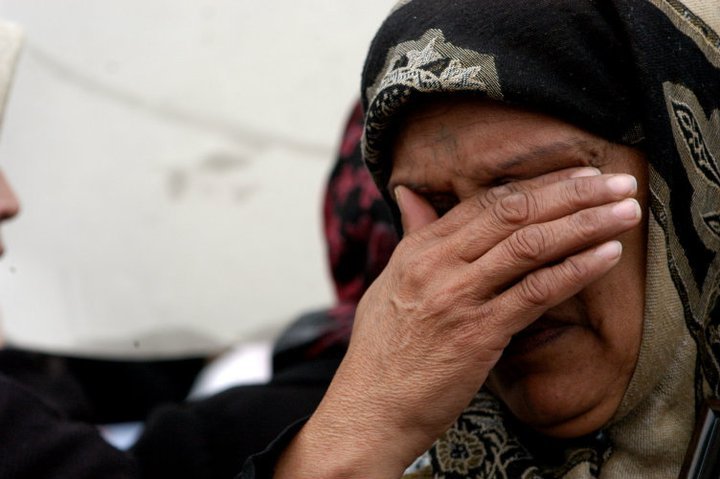Mourning refers to feeling or expressing grief and sorrow upon a loss or difficult situation and adapting to it. Both the term and act of ‘mourning’ is most common when sadness is displayed upon the death of someone.
As humans, we all face adversity, loss and death of loved ones. It is natural to be sad, in grief and sorrowful, in such situations. Islam recognizes this and legislates rulings surrounding it, in order that we remain within the framework of the noble book of Allāh and the blessed teachings of the Prophet Muḥammad (peace and blessings upon him).
How to Mourn?
Feeling and expressing sorrow at the demise of someone is a reality. Various cultures, religions and communities mourn in diverse ways. Some halt all their work while others wear dark or light clothing. Wailing, singing, disconnecting from others, self inflicted torture etc. are different ways people choose to mourn.
Mourning in Islam
In Islam, mourning is practiced by exercising patience, gradually coming to terms with the loss, anticipating rewards, supplicating to the Almighty and continuing with life.
Processing the Loss and Coming to Terms with It
The Messenger (peace and blessings upon him) said,
“To God belongs what He takes and what He grants. Everything is decreed by Him for a specified time.” (Saḥīḥ Muslim)
Losing a loved one is devastating. It is a heart breaking and life halting moment. Coming to terms with the loss is challenging. The calamity will entail shock, denial, anger and grief. However, we are instructed to try our best to process the grief in a calm manner, accept the reality and continue with life. One must make efforts to understand the calamity and realize that the Almighty is in control. He, from His wisdom, which we may not be aware of, makes decisions regarding everything including the losses or adversities we face. Life must continue. We must carry on being productive and creative in our lives while being hopeful for the best.
Patience & Anticipation of Rewards
Upon the demise of his grand daughter, the Prophet Muḥammad (peace and blessings upon him) advised his daughter,
“Kindly exercise patience [upon this loss] and be hopeful of the rewards” (Saḥīḥ Muslim)
Imam Shāfi’e (may Allāh’s mercy be upon him) has quoted a beautiful statement on the authority of Jā’far bin Muḥammad (may Allāh be pleased with him) which was articulated at the demise of the Prophet Muḥammad (peace and blessings upon him),
“For every calamity, the Almighty is your comfort, a replacement of all that perishes, a recovery for every loss. Have faith and hope in the Almighty. For indeed the one afflicted with an adversity is showered with endless rewards [in result of their patience and acceptance of the reality].” (Musnad al-Shāfi’e)
Supplicating to the Almighty
One of the best times to turn to the Almighty, in prayer and supplication, is upon experiencing a calamity. The Almighty definitely listens to a heart that is going through pain and grief. He, the Almighty is Merciful and will answer prayers and supplications. He will provide the healing and comfort. This is an occasion to pray for yourself and also the one you have lost.
The Messenger (peace and blessing upon him) advised Umm Salamah (may Allāh be pleased with her) to recite the following supplication, when she found it too difficult to bear with the demise of her loving husband,
“We belong to Allāh and to Him shall we return. O Allāh! Compensate me in my affliction, recompense my loss and give me something better in exchange for it.” (Saḥīḥ Muslim)
Duration of Mourning
Mandatory practices and responsibilities owing to Allāh (such as fardh obligatory prayers) are never halted or abandoned by a believer. When grief strikes one may need time to process the affliction. In general, mourning where one halts some of their regular activities (such as work or play), to express sorrow or to grieve is only permitted, islamically, for three days after the demise. This is due to a reliable prophetic narration recorded in Saḥīḥ Bukhārī. After three days, one may still be in sadness and sorrow, however one should continue with their schedules and regular activities (see: Zād al Ma’ād & ‘Omdat al Qārī). A believer uses time wisely in productive and meaningful activities. Islam is not a religion of perpetual mourning and long periods of grief. A believer is constant in making positive changes for oneself and others.
A Widow’s Mourning in Islam
A widow’s mourning period is not limited to the three days only, however she is obligated (meaning it is wājib for her) to mourn for a period of four months and ten days. During the mourning period which is also her iddah (waiting term), she is advised to abstain from beautifying herself and from leaving the home unnecessarily.
“Those amongst you [husbands] who are taken by death and leave wives behind – they [the wives,] shall wait four months and ten days. And when they have fulfilled their term, then there is no objection upon you for what they do with themselves in an acceptable manner [regarding marriage and their future life].” (Qur’ān 2:234)
“It is prohibited for a woman who believes in Allāh and the day of judgment to mourn any dead person more than three days except her husband four months and ten days.” (Bukhārī)
Wailing
A natural weeping or cry, due to grief or loss of a loved one, is not questioned. However, deliberately wailing loudly, screaming, pretentious lamenting or moaning to display grief is prohibited in Islam. We are advised, even in difficult times, to keep our calm and process the reality of occurrences with dignity. The Messenger (peace and blessings upon him) has stated,
“Do not destroy the rewards of your affliction by shrieking and loud wailing. Wailing does not return the deceased nor remove the grief. What has happened, was decreed to occur.” (Ṭabrānī)
“Bewailing loudly upon the dead is an act of disbelief.” (Saḥīḥ Muslim)
Self Inflicted Torture & Irresponsible Practices of Ignorance
Self inflicted torture is prohibited in every circumstance and situation. Our bodies and resources are entrusted by the Almighty. We are never to abuse them or cause harm to ourselves with them. Some cultures display their sorrow, while mourning, by self inflicting torture. This is against the teachings of the Qur’ān and prophetic sunnah.
“The woman who weeps very loudly, shaves her hair, or tears her clothes when a beloved one dies is detested.” (Bukhārī)
“He is not of us who beats his face, tears his clothes and bewails loudly.” (Bukhārī)
It is also a devilish plot to alter the body with torture, as mentioned in the following verse,
“And I (the devil) will command them so they will disfigure the creation of Allāh.” (Qur’ān 4:119)
Consoling the Inflicted
Reminding the afflicted to be patient, sharing and understanding their pain, providing comfort to help them heal is mustaḥab (a praise worthy act) in Islam. Consoling the bereaved can be done at anytime, prior to burial of the deceased or afterwards. It is also permissible after the three-day period of acceptable mourning, for those who were not present, following the demise, as discussed in well known fiqh manuals. It is preferred to avoid large gatherings for the purpose of consoling the bereaved. The objective of the consoling is to help reduce the pain and grief, and to uplift the spirits of the aggrieved so they can continue with positivity in their future life, after the affliction.
“Any believer who consoles his brother [in faith or humanity], who is afflicted with a difficulty, the Almighty will award them with a garment of honour on the day of judgement.” (Ibn Mājah)
Mourning Ḥusayn (may Allāh be pleased with him), the Grandson of the Prophet (peace and blessing upon him)
There are some who believe the martyrdom of Ḥusayn bin ‘Ālī (may Allāh be pleased with them) should be mourned in such a way that grief be displayed by wailing and self torture. As discussed above, these are prohibited actions, regardless of who the personality is. There is no doubt that Ḥusayn (may Allāh be pleased with him) and his martyrdom is a magnanimous event from our Islamic history. However, countless other personalities have been martyred [even in Muḥarram] and major events have occurred in the past. However, there was never annual mourning sessions or events, rendered by anyone amongst the Companions and pious predecessors. In fact, Ḥusayn (may Allāh be pleased with him) himself said to his sister,
“My dear sister, I present to you a vow so make sure you fulfill my vow. When I die, you shall neither tear your clothes, nor scratch your face, nor curse anyone for me.” (Tarīkh Ṭabarī)
The apparent narrations presented by some, that all wailing is forbidden except upon Ḥusayn (may Allāh be pleased with him) are fabricated, according mainstream scholars of Islamic sciences of ḥadīth and jurisprudence.
From another perspective, the learned have mentioned that mourning only takes place upon a dead person, where as martyrs, according to the Qur’ān, are alive [in one sense] (see verse 2:154). The great poet of Pakistan, Muḥammad Iqbal, indicating this,saying,
“Let the mourners of Ḥusayn be informed that believers never mourn martyrs. We are all deep lovers of the Prophet’s family, even more than our own lives. We do not make a scene [with wailings and self torture] about them in public. Regrets be upon the one who believes Ḥusayn is dead [and not a living martyr], for we do not mourn the living and vibrant.”
To end off, I pray that the Almighty guide one and all to remain within the noble framework of His teachings, reduce the agony of all those who suffer and bring positivity, hope and resilience.




